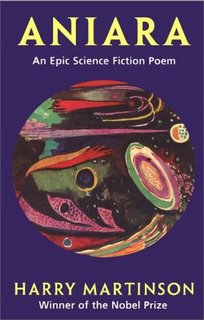Fifty Years Out Toward Lyra
 The Swedish language has produced very few really good works of science fiction. (Give us a break, Swedish has less than nine million native speakers). One of these few really good works was published 50 years ago, and the occasion was celebrated with a symposium today at the Academy of Letters. It might have been the Swedish Academy, because the book's author was a member and they awarded him the Nobel for it. I'm talking about Harry Martinson's science fiction verse epic Aniara.
The Swedish language has produced very few really good works of science fiction. (Give us a break, Swedish has less than nine million native speakers). One of these few really good works was published 50 years ago, and the occasion was celebrated with a symposium today at the Academy of Letters. It might have been the Swedish Academy, because the book's author was a member and they awarded him the Nobel for it. I'm talking about Harry Martinson's science fiction verse epic Aniara.The Aniara is an interplanetary spaceship full of colonists bound for Mars, escaping from an Earth ruined by pollution and nuclear fallout. On its way from Earth the spaceship evades an asteroid, gets thrown off course, sustains heavy damage to its steering, and ends up randomly on a course for Lyra. The constellation's stars are so far away that when the Aniara finally arrives there its passengers will have been dead for aeons. In 103 cantos of varying length and lyrical form, Martinson tells stories of the people on board as they progress through the years on their pointless journey into interstellar space.
We came from Earth, from Dorisland,The book is very much a product of the Cold War: marked by concerns about environmental degradation and the nuclear threat. It is also a pessimistic book, a vision of the futility of human endeavour, very far in tone from what for example Robert Heinlein was writing at the time. But Aniara draws from the same background of sf tropes as Heinlein's books, offering an alternative and cautionary take on what is sometimes called Golden Age sf.
the jewel in our solar system,
the only orb where life obtained
a land of milk and honey.
Describe the landscapes we found there,
the days their dawn could breed.
Describe the creature fine and fair
who sewed the shrouds for his own seed
till God and Satan hand in hand
through a deranged and poisoned land
took flight uphill and down
from man: a king with ashen crown.
Aniara, canto 79, by Harry Martinson.
Translated by Stephen Klass and Leif Sjöberg 1999.
As a child, I used to feel a deep stomach-churning horror at the thought of that crippled spaceship falling away into the darkness. Looking at it now, I'm not so sure the alternatives would have been much better. The people on the Aniara fled a dying Earth to live as colonists on inhospitable Mars. Neither their origins nor their intended destination was Paradise, and so their fall into darkness shouldn't really be seen as a fall from grace. They have food and power to last them for years. They continue to produce cultural fads, religions, even scientific discoveries. Sure, they're all fucked. But they were fucked before they even went aboard the Aniara. And that, I guess, is how the gloomy yet brilliant poet, then just into his 50s, saw life. We're fucked. Nobody gets out of here alive.
*
Harry Martinson wasn't a glumster all of his life. For youthful vigor, optimism and prose-lyrical mastery, read his early books about life as a sailor in the merchant navy: Resor utan mål (1932) and Kap Farväl (1933).[More blog entries about books, reading, sf, sciencefiction, sf, poetry, Sweden; böcker, läsning, sciencefiction, sf, poesi, harrymartinson.]
Labels: books, sciencefiction



2 Comments:
I'd love to see a poll among critics in the establishment about whether Aniara is SF or not.
I have a strong suspicion that the majority would go with "No, it's litterature, not SF".
/Akhôrahil
Yeah... I once heard a member of the Harry Martinson society claim rather vehemently that Martinson did not like science fiction and was not that kind of writer at all. So apparently the guy came up with all the standard American sf stuff all by himself. (-;
Post a Comment
<< Home